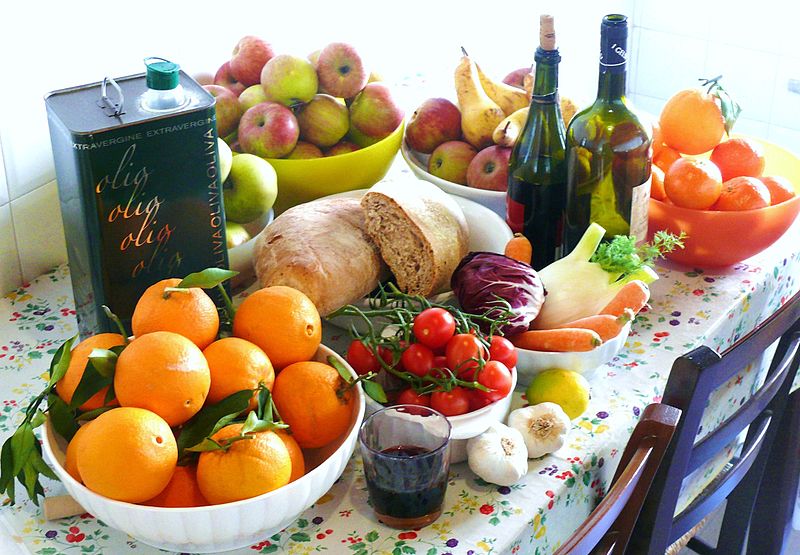 Many nutrition experts confidently recommend the Mediterranean Diet. Its vegetables, fruits, whole grains, nuts, olive oil, limited dairy products, and other natural foods provide a full range of nutrients even while minimizing or eliminating red meat and processed foods considered detrimental to health. But the question of whether one can gain further benefit from adding supplements to protect against hidden deficiencies or optimize health and performance remains open.
Many nutrition experts confidently recommend the Mediterranean Diet. Its vegetables, fruits, whole grains, nuts, olive oil, limited dairy products, and other natural foods provide a full range of nutrients even while minimizing or eliminating red meat and processed foods considered detrimental to health. But the question of whether one can gain further benefit from adding supplements to protect against hidden deficiencies or optimize health and performance remains open.
Certainly, turning to supplements would seem to violate the spirit of the Mediterranean Diet. Shouldn’t we trust Nature to provide us ample, complete nutrition in the form of food when we make the right choices? Didn’t the original models of the Mediterranean Diet–the Cretans of the 1950s–do very well without supplements? Shouldn’t we avoid excessive or even paranoid concern about hidden deficiencies and rather bask in the Mediterranean sun (or its local equivalent) while tasting the savory concoctions of Mediterranean chefs?
But the problem is actually more complicated. It requires us to sift through the contending arguments and considerations to find satisfactory answers. So let’s look first at the telling reasons to steer clear of supplements while consuming a Mediterranean Diet, then consider the arguments in favor of supplementation.
The Case for Avoiding Supplements
- Clearly, nutrients are best absorbed from whole foods where they mutually support each other’s uptake in natural proportions. The more they are purified and concentrated in supplements, the greater the chance that they will interfere with each other’s absorption. Too much iron can interfere with the absorption of zinc; too much calcium, with the absorption of iron; and so on. This bioavailability argument applies equally to fortified foods, showing why we should prefer whole foods. And it suggests that concentrated intake of nutrients in supplements can interfere with the bioavailability of certain medications as well.
- When taking a supplement, one runs a risk of overdosing. This is clearly the case when people take megadoses over months and years, but it can also occur insidiously when the margin of safety is narrow. For instance, the upper safety limit of selenium is just five times the minimum daily requirement. Overdosing can cause serious liver toxicity and other damage, and it can even be life-threatening. The use of herbal and biochemical substances for boosting muscle mass and performance, for example, can easily become abuse if one has a mentality of “the more, the better”.
- It’s not easy to determine the right nutritional supplement in any case, and so one can take the wrong supplement instead of a potentially useful one.
- Many people perform poorly in self-diagnosis and self-treatment. This can lead to dangerous delays in consulting a medical practitioner and treating a serious condition. Eating in a Mediterranean way and supplementing substantially could lull one into a sense of virtue and quasi-invulnerability that would blind one to reality.
- Lastly, supplements cost money–sometimes a lot. When making the purchases and choices required to eat such a healthy diet, it seems perverse to spend even more and fret over supplement choices just to assure that one is truly healthy.
So there are telling reasons not to supplement when adhering to the Mediterranean Diet. However, now we need to look at the other side of the story.
Reasons to Supplement
- Even in rich countries with abundant food available at rather low prices, there are occasional outright nutritional deficiencies. So we must assume that marginal food deficiencies also exist and are in fact more common. These can lead to medical problems and exacerbate existing conditions. The well-known problems of the elderly in absorbing sufficient zinc, leading to lowered immunity, are a case in point. Whether people adhering to a Mediterranean Diet might still be vulnerable to such marginal deficiencies is an interesting point that deserves a full investigation.
- Even if one tries to eat a Mediterranean diet, it is quite likely that the diet one actually eats diverges from the ideal, including from the Cretan model. On social occasions one might consume poor-quality food offered by a host, for instance. Or one would not have access to wild greens, a fundamental component of the Cretan diet, with their rich mixture of phytochemical nutrients. Not to speak of Cretan specialties like snail. In addition, those on a tight budget might steer clear of nuts and even high-quality fruits and vegetables because they cost too much. Or one could avoid nuts because, as finger food, they tempt one to overindulge. So such people are eating an incomplete Mediterranean Diet. It could well be that most adherents to the Mediterranean Diet actually fall into this category. This incompleteness furnishes an argument in favor of supplementation.
- Clearly, the minimum RDAs fall well below the optimal level for many vitamins and minerals. So following the MD might protect against deficiencies but fail to provide optimal levels for peak performance. In some cases, the differences might be inconsequential, but in others (Vitamin C for many people?) a clear benefit could be obtained by supplementation.
- Finally, and perhaps most persuasively, one can argue that certain categories of people–and certain circumstances that could temporarily affect any person–require supplementation even beyond a fully adequate Mediterranean Diet. Not only are all people different, but each of them changes over time. So it would ask too much of the Mediterranean Diet to cover all eventualities.
Who are these people?
- Strict vegans. At a minimum they need Vitamin B12, and they could perhaps benefit from other micronutrient supplements. Ovo-lacto-vegetarians also should supplement with Vitamin B12 but otherwise are at less risk than vegans for micronutrient deficiencies.
- Women who bleed too much during menstruation, who are preparing for pregnancy, who are pregnant, or who are lactating.
- People with gastrointestinal ailments that reduce the absorption of nutrients.
- People taking medications that interfere with absorption of specific nutrients.
- People with conditions that reduce appetite.
- Heavy-drinking alcoholics and drug abusers.
- The elderly, even if strictly adhering to a Mediterranean Diet.
- At-risk children, even if eating an abundant Mediterranean Diet. For instance, a child in an area with a high incidence of infectious diseases might well be a candidate for supplementation with Vitamin C, and a child with dark skin living in a polar region might well be a candidate for supplementation with Vitamin D in the winter
The Bottom Line
Evidently, good arguments can be found on either side of the question of whether to supplement in the Mediterranean Diet. One could suggest that all normally healthy individuals aged 18-65 who adhere to a rather full MD could fare well by refraining entirely from supplementation. Alternately, they could take a single multivitamin, multimineral tablet three times a week–just to make sure that they were not vulnerable to some hidden marginal deficiency.
Those who fit into the at-risk categories listed above could usefully supplement–best in consultation with a medical practitioner.
However, it should be noted that all this argumentation does not address the important question of whether one can use specific supplements to treat diseases in a drug-like manner, or to boost performance in healthy people.1 That is a large subject and deserves its own discussion. But it moves away from a concern over the adequacy of the Mediterranean Diet itself. Those who adhere faithfully to a Mediterranean Diet would presumably encounter fewer diseases that might require treatment of any kind, possibly including with megadosed supplements.
Kenneth J. Dillon is an historian who writes on science, medicine, and history. See the biosketch at About Us. See also The Med Plus Diet, Six Key Supplements, and The Mediterranean Diet for Weight Loss.
